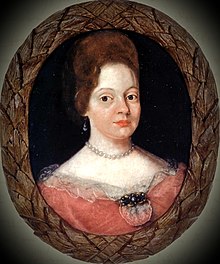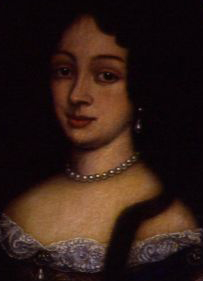Catharina Regina von Greiffenberg
Catharina Regina von Greiffenberg, Baroness von Seyssenegg, ( born September 7, 1633 Castle Seisenegg in cattle village near Amstetten in Lower Austria, † April 10, 1694 in Nuremberg ) was one rooted in the Protestant mysticism spiritual poet. It is one of the most important Austrian poets of the Baroque period.
Life
It was (now Seisenegg, in the municipality of Viehdorf in Amstetten, Lower Austria ) on 7 September 1633 Castle Seyssenegg born. With seven years ( in 1641 ) her father Johann Gottfriedt of Greiffenberg and her uncle Hans Rudolf von Greiffenberg died was her guardian. He allowed her one for that time unusually comprehensive Education: She studied languages , undertook educational trips and dealt with Georg Philipp Harsdorffer art theories and Sigmund von Birken's seal. With birch she married many years of very intense friendship. Even with other " exiles " as Wolfhelm Hardt Hohberg, Johann Ludwig von Kuefstein and Johann Wilhelm von Stubenberg she stood in lively connection.
Although related to Catharina and 25 years older, demanded her uncle and guardian Hans Rudolf 1659 the marriage of her. After much reluctance, she finally relented and in 1664 the couple were married. The marriage could only be closed by massive influence of the Brandenburg court in Bayreuth.
1666, the couple returned back to Seisenegg. In the aftermath Catharina made several trips to Vienna with the intention to convert the Emperor Leopold I to the Protestant faith. This purpose is also served some of their writings. The fact that the plan could not rise, and they thus exposing even personal threats, was in sight. Yet they persisted until her death.
Was discovered in the literary talent of the young Catharina Regina from their " neighbors " Johann Wilhelm von Stubenberg, who lived not far from Seisenegg at Schallaburg and had made himself a name as a translator. Published in 1662 with his support and Birken in Nuremberg the clergy sonnets, songs and poems, a collection of devotional poems. 1675 collection of poems was published in the Victory Column repentance and faith against the hereditary enemy of the Christian name, in which the current threat of Austria by the Ottomans was the theme. Read these works were at that time by virtually no one. The strong tendency towards mysticism language and the encrypted metaphors they made themselves difficult to access for religious contemporaries. In their time, their works were read only regionally. In the 1960s, the rediscovery of the literary oeuvre Catharina Regina von Greiffenbergs through the study of literature began. The research she is now regarded as "most important poet of the 17th century".
Born into the world of the Lower Austrian nobility, also held the Greiffenbergs - like most members of her class - the Lutheran faith, which they were at the mercy of religious and political repression of the Catholic Counter-Reformation in the Habsburg state. Her family had grown rich by owning copper mines, but it was the uncle Hans Rudolf, who was her guardian, did not succeed after the death of their father to keep this property - the Greiffenbergs impoverished. The debt burden on the one hand and the tribulations through the Counter-Reformation on the other hand eventually led that 1673 Castle Seisenegg to Matthew crack - later knighted " Freiherr von Risenfels " - had to be overwritten. Crack had made it through clever financial transactions and debt, to collect the entire estate. 1677 died Hans Rudolf von Greiffenberg. His widow Catharina decided a year later, with her old mother to leave Seisenegg forever.
1679 she moved to many hardships and unpleasant court proceedings finally finally to Nuremberg, where she deepened her already knotted friendship with Sigmund von Birken. With him she had previously had a lively exchange of letters, which are still preserved in the archives of the North Pegnesischen flower today and showing that Birch has worked decisively all their works until his death in 1681.
Her work includes approximately 4,000 printed pages, it consists exclusively of spiritual poems. Particularly noteworthy are her beautiful figure poems, for the "cross poem" can serve as an example.
Works (selection)
- Spiritual Sonnets / songs and poems to Gottseeligem pastime, 1662
- In Allerheiligst and Allerheilsamsten suffering and death of Jesus Christ Twelve devout considerations, 1672
- Victory Seule of repentance and faith / against the hereditary enemy Christian name, 1675
- The Most Holy Incarnation / Birth and Youth of Christ Jesus: / Twelve devout considerations, 1678
- Life, teachings and miracles of Christ, 1683
- Of the Blessed Life of Jesus Christ Devout considerations Six Of Its teachings and Wunderwercken. 1693
- Of the Blessed Life of Jesus Christ Ubrige Six Considerations Of Its Holy convertible / miracles and prophecies of and bit his most holy passion and death. Which also added a prayer by the Holy Supper, 1693rd
Her works were for a long time hardly an audience. Only in recent decades, a new discovery has begun. After a first systematic assessment of sources including the exchange of letters with birches by Horst Joachim Frank ( CRVG, studies on their personality and sonnet poetry, Dissertation 1957; CRVG, life and the world of the baroque poet, 1967), PM Daly ( poetry and emblems at CRVG, 1976) and Ruth Liwerski ( the words work of CRVG, 1978) was followed by a study of the Austrian local historian Heimo Cerny ( CRVG, origin, life and work of Germany's largest Baroque poet, 1983) and more recently a discussion of " function and importance of imagery in the birth of the considerations CRVG " ( AD M. Pumplun, 1995). The new edition of the correspondence between Sigmund von Birken and Catharina Regina von Greiffenberg (2005 ), however, brought little new light on the poet.
Werkausgaben
- Martin Bircher (Ed.): The Complete Works in 10 volumes. Millwoood NY 1983
- Hubert Gersch: poems. Catharina Regina von Greiffenberg. Berlin 1964
- Sigmund von Birken: Works and Correspondence, Volume 12: The correspondence between Sigmund von Birken and Catharina Regina von Greiffenberg. Tübingen, 2005.
- Lynne Tatlock (ed. and tr ), Catharina Regina von Greiffenberg: Meditations on the Incarnation, Passion, and Death of Jesus Christ (Chicago, 2009) ( The Other Voice in Early Modern Europe).









